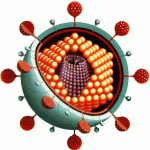Virology
|
14 october 2014 13:32:38 |
| Curcumin inhibits breast cancer stem cell migration by amplifying the E-cadherin/beta-catenin negative feedback loop (Epidemiologic Perspectives & Innovations) |
|
Tweet IntroductionThe existence of cancer stem cells (CSCs) has been associated with tumor initiation, therapy-resistance, tumor relapse, angiogenesis and metastasis. Curcumin, a plant ployphenol, has several anti-tumor effects and has been shown to target CSCs. Here, we aimed at evaluating (i) the mechanisms underlying the aggravated migration potential of breast CSCs (bCSCs), and (ii) the effects of curcumin in modulating the same.
Methods:
The migratory behaviour of MCF-7 bCSCs was assessed using cell adhesion, spreading, transwell-migration and 3D-invasion assays. Stem cell characteristics were studied using flow cytometry. The effects of curcumin on bCSCs were deciphered by cell viability assay, western blotting, confocal microscopy and si-RNA mediated gene-silencing. Evaluations of breast cancer patient samples were performed using immunohistochemistry and flow cytometry.
Results:
Here we report that bCSCs are endowed with aggravated migration property due to the inherent suppression of the tumor suppressor, E-cadherin, which is restored by curcumin. A search for the underlying mechanism revealed that in bCSCs, higher nuclear translocation of beta-catenin (i) decreases E-cadherin/beta-catenin complex formation and membrane retention of beta-catenin, (ii) up-regulates the expression of its EMT-promoting target genes including Slug, thereby (iii) down-regulating E-cadherin transcription to subsequently promote EMT and migration of these bCSCs. In contrast, curcumin inhibits beta-catenin nuclear translocation thus impeding trans-activation of Slug. As a consequence, E-cadherin expression is restored thereby increasing E-cadherin/beta-catenin complex formation and cytosolic retention of more beta-catenin to finally suppress EMT and migration of bCSCs.
Conclusions:
Cumulatively, our findings disclose that curcumin inhibits bCSC migration by amplifying E-cadherin/beta-catenin negative feedback loop. |
| 195 viewsCategory: Pathology, Virology |
 Environmental enteropathy and malnutrition: do we know enough to intervene? (Epidemiologic Perspectives & Innovations) Environmental enteropathy and malnutrition: do we know enough to intervene? (Epidemiologic Perspectives & Innovations)Genes and post-term birth: late for delivery (Epidemiologic Perspectives & Innovations) 
|
| blog comments powered by Disqus |
MyJournals.org
The latest issues of all your favorite science journals on one page
The latest issues of all your favorite science journals on one page



